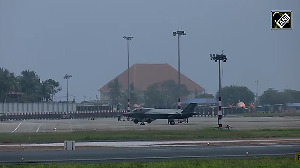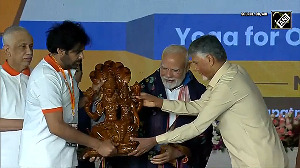Warren Buffett got to play the hero recently when he offered to re-insure $800 billion of bonds for MBIA, Ambac Financial and Financial Guaranty Insurance. Buffett's plan would allow the trio to regain a firmer financial footing and inject confidence into the debt markets.
There's a catch though: Buffett only wants municipal bonds, which are at relatively low risk of defaulting. He's offering to insure low-risk debt for a hefty fee.
In pictures:
Big-money bets of the billionaires
India's 40 richest
Buffett's motive isn't altruism, just greed. "When I go to Saint Peter I will not present this as some act that will entitle me to get in (to Heaven)," he said. "We're doing this to make money."
Lacking the $52 billion fortune needed to carve out a stake in the municipal bond insurance market? Don't feel bad. You can learn plenty just by watching the moves of Buffett and his fellow billionaires. After all, it's hard to find smarter money than these guys--or riskier.
Sheldon Adelsonis betting heavily on Asian gamblers. Through his company Las Vegas Sands, he's already spent billions constructing two casinos in the Chinese gambling hot spot of Macau and has plans to build 13 hotels in the area.
In pictures:
The world's billionaires
The richest people you've never heard of
In Singapore, he's building a massive casino complex called the Marina Bay Sands on a 51-acre site. The cost of the project was initially announced to be $3.6 billion. A weak dollar and a rise in building costs could push the price up to $4.6 billion.
Sam Zell's going long on newspapers. He picked up Tribune in an $8.2 billion buyout year. Tribune is the nation's second-largest newspaper publisher by sales and owns papers like the Los Angeles Times and the Chicago Tribune.
Using a fortune built in real estate, Zell is diving into an industry struggling with declining circulation and advertising in the Internet age. The Web's also causing other problems. A video of Zell cursing at a Tribune employee is making the blog rounds, bringing the billionaire plenty of unwanted attention.
Maybe take a look at Aubrey McClendon. The US' 220th richest person when we last assembled our list of America's 400 richest people last fall, he has recently been snapping up stock of Chesapeake Energy, the natural gas producer he founded. Since November, McClendon has acquired nearly a million shares.
In pictures:
The frugal billionaires
10 billionaire family feuds
It's a notable endorsement for Chesapeake. McClendon now owns 29.6 million shares of the company. The majority of his estimated $2.1 billion net worth is tied up in Chesapeake stock. Instead of trying to diversify his bets, McClendon is doubling down.
It all ties back to McClendon's bullishness on natural gas. As Chesapeake's chief executive, McClendon is aggressively ramping up the company's gas holdings. Chesapeake racked up more than $11 billion in debt since 2002 to acquire assets.
The buying spree makes Chesapeake the third-largest natural gas producer in the US McClendon's fortune will lose a huge dent if natural gas falls or if Chesapeake's stock price declines.
So is McClendon being foolhardy? Not necessarily. He's just thinking differently from an average person with an average bank account. Taking big risks to achieve bigger rewards is more important to the rich than the non-rich, according to Russ Alan Prince, president of market research firm Prince & Associates.
In researching for his soon-to-be released book The Middle-Class Millionaire, Prince asked both middle-class people and millionaires if choosing projects with greater risk and greater prospective reward is very important in achieving financial success. A third of those polled from the middle-class said it was, compared to more than half the millionaires.
McClendon has the opportunity to hit the jackpot. Morningstar analyst Justin Perucki says that if natural gas prices rise 10 per cent, Chesapeake Energy shares could be worth $77 per share, an 86 per cent premium on Chesapeake's Tuesday closing price. That increase in would boost the value of McClendon's stake by over $1 billion dollars. That should catch your attention






